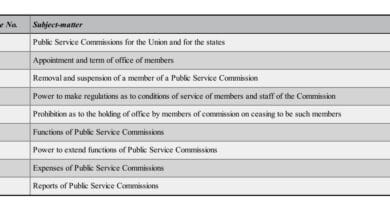National Commission for Scheduled Castes (NCSC)
Contents
National Commission for Scheduled Castes (NCSC)
Introduction
The National Commission for Scheduled Castes (NCSC) is a constitutional body established under Article 338 of the Constitution of India with the primary objective of safeguarding the rights and interests of Scheduled Castes (SCs). The Commission serves as a vital institutional mechanism to monitor and evaluate the implementation of various safeguards and policies for SCs, ensuring their social, educational, and economic upliftment.
Constitutional Provisions
Article 338 of the Constitution mandates the formation of a commission to inquire into specific complaints regarding the violation of rights of SCs and evaluate the effectiveness of various welfare schemes designed for their upliftment. According to Article 366(24), “Scheduled Castes” means such castes, races or tribes or parts of or groups within such castes, races or tribes as are deemed under Article 341 to be Scheduled Castes for the Constitution.
Article 341(1) empowers the President to specify, through public notification, the castes, races, or tribes deemed to be Scheduled Castes in any State or Union Territory, after consulting the respective Governor.
Historical Evolution
The evolution of reflects changing approaches to protecting SC rights in India:
1950: Office of the Commissioner for Scheduled Castes & Scheduled Tribes was created for effective implementation of constitutional safeguards
1978: Government created a non-statutory Commission for SCs and STs
1987: It was renamed the National Commission for SCs and STs
1990: The 65th Constitutional Amendment Act established a high-level National Commission, replacing the previous structure
2003: The 89th Constitutional Amendment Act split this Commission into two separate bodies
2004: The National Commission for Scheduled Castes was formally established
Composition and Tenure
The comprises:
One Chairperson
One Vice-Chairperson
Three other Members
Appointment Process: All members are appointed by the President of India through a warrant bearing his signature and seal. The President also determines their conditions of service and tenure of office.
Tenure:
Chairperson, Vice-Chairperson, and other members serve a term of three years from the date they assume office
They are not eligible for reappointment beyond two terms
Members have the rank of Secretary to Government of India
Rotation Provision: In a block of three terms, a person belonging to SCs shall hold office for two terms and a person belonging to STs shall hold office for one term.
Functions of NCSC
The Commission is entrusted with comprehensive responsibilities under Article 338(5):
Primary Functions:
Investigate and monitor all matters relating to constitutional and legal safeguards for SCs and evaluate their effectiveness
Inquire into specific complaints regarding deprivation of rights and safeguards of SCs
Participate and advise on the planning process for socio-economic development of SCs
Evaluate progress of development initiatives at Union or state level
Present annual and periodic reports to the President on the functioning of safeguards
Recommend measures to Union or state governments for effective implementation of protections
Perform additional functions as specified by the President
Special Responsibilities:
The Commission also discharges similar functions for the Anglo-Indian community
Until the 102nd Amendment Act of 2018, it also handled functions related to Other Backward Classes (OBCs)
Powers of NCSC
The Commission possesses significant powers equivalent to a civil court while examining complaints or investigating matters:
Judicial Powers:
Summoning and enforcing attendance of any individual from any part of India and examining them under oath
Requiring discovery and production of documents relevant to inquiry
Receiving evidence through affidavits
Requisitioning public records or documents from courts or offices
Issuing summons for examination of witnesses and documents
Exercising additional powers determined by the President
Regulatory Powers:
Power to regulate its own procedure for meaningful performance
Central and state governments are required to consult the Commission on all major policy decisions impacting SCs
Recent Activities and Reports
The Commission submitted its annual report for 2023-24 to President Droupadi Murmu in July 2024. The report includes:
Comprehensive review of constitutional provisions for SCs
Key findings from extensive reviews and spot visits
Recommendations for strengthening institutional accountability
Measures for enhancing SC community empowerment
In November 2024, organized an interaction programme with other constitutional commissions (NCST, NCM, NCBC, and NCSK) to discuss common issues and improve effectiveness.
Significance
The serves as a crucial bridge between constitutional ideals and real-world implementation for SC welfare. It ensures that socio-economic rights of SCs are not just symbolic but backed by an active constitutional institution. Through regular monitoring, judicial support, and governmental accountability, the Commission reinforces India’s commitment to social justice and equality.
The Commission continues to evolve in response to changing socio-political dynamics, working towards creating a more equitable society through its annual reports, investigations, and policy recommendations.
Discover more from Simplified UPSC
Subscribe to get the latest posts sent to your email.



